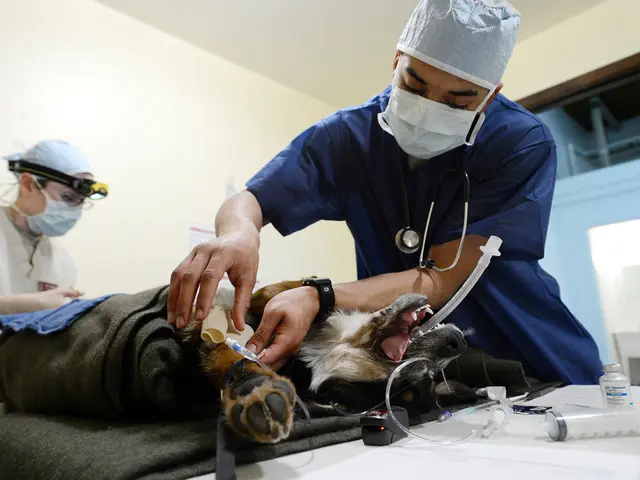Measles is not preventable by Vitamin A. Specialists clarify the true functions of this dietary supplement.
Measles cases in the United States have exploded, with over a thousand reported in several states. With recent conversations from Robert F. Kennedy Jr., some people are looking toward vitamin A supplements as a potential cure or prevention method. To shed some light on the situation, we asked three medical and public health pros some common questions about vitamin A supplements and preventing the spread of measles.
Can vitamin A prevent or treat measles?
Dr. Monica Gandhi, an infectious disease specialist with the University of California, San Francisco, explains, "Vitamin A is a fat-soluble vitamin that aids vision and the functioning of the immune system. It can be found in various common foods like eggs, cheese, fish, milk, orange, and green vegetables."
So, what's the deal with vitamin A and measles? All three experts said that it provides zero benefit as a preventive measure. However, the disease itself can lead to a vitamin A deficiency, amplifying symptoms.
Dr. Danelle Fisher, another pediatrician, confirms, "While it strengthens the immune system, vitamin A treatments do not protect against diseases like measles. When a person is infected with the measles virus, their body can develop a vitamin A deficiency. Treatment with two oral doses of Vitamin A can be helpful in this situation."
However, it is vital to understand that vaccination remains the best prevention method against measles infection, according to national health authorities.
Other potential treatments
Recently, Kennedy Jr. brought up budesonide and clarithromycin as treatments for measles. The medical community, though, has expressed concern about promoting these treatments with little evidence supporting their benefits for treating viral infections like measles.
Dr. Daniel Ganjian, a board-certified pediatrician, states, "There is no evidence backing the use of budesonide or other steroids as a standard treatment for measles. Although a recent study found no signs of harm caused by steroid use in measles, its use should not be regarded as standard treatment."
Regarding clarithromycin, Ganjian underlines that antibiotics are only reserved for treating confirmed bacterial infections, not viral infections like measles.
What can I do to protect myself and others against measles?
The Centers for Disease Control and Prevention (CDC) recommends that people infected with measles isolate for four days before and after the rash appears to avoid transmission.
Gandhi pointed out, "Patients with measles should remain in isolation to prevent transmission, as recommended by major guidelines."
Dr. Fisher urgently encourages vaccination as the best way to protect oneself and others. "Vaccination is the only effective way to prevent measles, especially in regions where outbreaks are occurring," she emphasizes.
Vitamin A and cod liver oil: Do I need supplements?
Dr. Gandhi shares that an excess of vitamin A can cause damage to the body, hence the importance of not ingesting too much. "Vitamin A is a 'fat-soluble' vitamin which stays around in the body and can cause toxicity if consumed in excessive amounts," she says.
The USDA recommends the following daily intake:
- Babies (0-6 months): 400 mcg
- Kids (7-10 years): 600 mcg
- Teenagers (11-14 years): 600 mcg for girls, 700 mcg for boys
- Adult women (19-50 years): 700 mcg for non-pregnant, 800 mcg during pregnancy
- Adult men (19-50 years): 900 mcg
Dr. Fisher says that in rich countries like the United States, people can usually ingest the recommended daily amount from their diets only. Certain populations such as premature infants or those with crohn's disease or celiac disease, though, might require supplements.
- Dr. Monica Gandhi, an infectious disease specialist, states that vitamin A can be found in various common foods like eggs, cheese, fish, milk, orange, and green vegetables.
- All three experts agreed that vitamin A provides no benefit as a preventive measure for measles.
- Dr. Danelle Fisher confirms that while vitamin A strengthens the immune system, it does not protect against diseases like measles.
- Vaccination remains the best prevention method against measles infection, according to national health authorities.
- Kennedy Jr. brought up budesonide and clarithromycin as treatments for measles, but the medical community has expressed concern about promoting these treatments without enough evidence supporting their benefits.
- Dr. Daniel Ganjian notes that there is no evidence backing the use of budesonide or other steroids as a standard treatment for measles.
- Regarding clarithromycin, Ganjian underlines that antibiotics are only reserved for treating confirmed bacterial infections, not viral infections like measles.
- To avoid transmission, the Centers for Disease Control and Prevention (CDC) recommends that people infected with measles isolate for four days before and after the rash appears.
- Dr. Fisher urgently encourages vaccination as the best way to protect oneself and others, especially in regions where outbreaks are occurring.
- While an excess of vitamin A can cause damage to the body, Dr. Gandhi recommends maintaining the daily recommended intake for optimal health and wellness, including cardiovascular health, mental health, fitness and exercise, and nutrition. The USDA recommends the following daily intake: babies (0-6 months): 400 mcg, kids (7-10 years): 600 mcg, teenagers (11-14 years): 600 mcg for girls, 700 mcg for boys, adult women (19-50 years): 700 mcg for non-pregnant, 800 mcg during pregnancy, adult men (19-50 years): 900 mcg, and in some cases, certain populations might require supplements.








